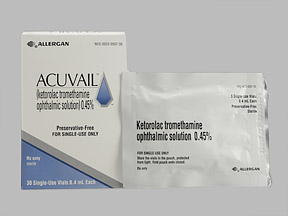
Acuvail Coupons & Savings Card – Discount Prices from $327.94
My prescription
Edit
0.45%, Acuvail (30 Solutions)
Select pharmacy

CVS
$353.68
COUPON PRICE
Walmart
$327.94
COUPON PRICE
Albertsons
$337.10
COUPON PRICE
Walgreens
$338.93
COUPON PRICEAcuvail savings card
Show this card to your pharmacist
Walmart
$327.94
BIN
ID
PCN
GRP
019876
LH40AD80D4
CHIPPO
LHX
Powered by
Related NSAIDs prescriptions
More prescriptions for pain
Related NSAIDs prescriptions
More prescriptions for pain
Price history for Acuvail
30 Solutions, 0.45%
Average retail price for Acuvail
Average SaveHealth price for Acuvail
Our price history data is based on aggregated prescription data collected from participating pharmacies in America. Our prescription data updates daily to reflect the latest price changes. If you notice a missing data point, it means there wasn't sufficient data available to generate a monetary value for that date.
*Retail prices are based on pharmacy claims data, and may not be accurate when we don't have enough claims.
Acuvail dosage forms
Dosage Quantity Price from Per unit 0.45% 30 Solutions $327.94 $10.93
| Dosage | Quantity | Price from | Per unit |
|---|---|---|---|
| 0.45% | 30 Solutions | $327.94 | $10.93 |
What is ACUVAIL used for?
ACUVAIL is used to treat pain and inflammation following cataract surgery. It is a nonsteroidal anti-inflammatory drug (NSAID) in the form of an ophthalmic solution.
Is ACUVAIL the same as ketorolac?
ACUVAIL is a brand name for the ophthalmic solution of ketorolac tromethamine. It is used to treat pain and inflammation in the eyes. While ACUVAIL contains ketorolac as its active ingredient, it is specifically formulated for use in the eyes.
What is the generic name for ACUVAIL?
The generic name for ACUVAIL is ketorolac tromethamine.
